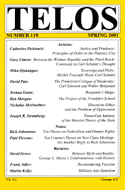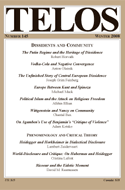By Philip Crone · Tuesday, September 15, 2009 Each Tuesday in the TELOSscope blog, we reach back into the archives and highlight an article whose critical insights continue to illuminate our thinking and challenge our assumptions. Today, Philip Crone looks at Catherine Pickstock’s “Justice and Prudence: Principles of Order in the Platonic City,” from Telos 119 (Spring 2001), as well as a response to Pickstock’s article from Donald C. Hodges and Christopher A. Pynes.
 Recent discussions surrounding the death of Senator Ted Kennedy and talk about health care reform have reintroduced some of the most fundamental questions about justice and society into American political discourse. As ill-informed and histrionic as many of today’s arguments are, the matters being discussed are of great importance. And while at first it may not seem to have much relevance to the issues currently discussed, Plato’s Republic is in many ways the first comprehensive and influential work of Western political philosophy. The key questions of the Republic—the roles of social groups, the ideal qualifications for civic leaders, and the guiding principles for society—continue to have great contemporary relevance. Recent discussions surrounding the death of Senator Ted Kennedy and talk about health care reform have reintroduced some of the most fundamental questions about justice and society into American political discourse. As ill-informed and histrionic as many of today’s arguments are, the matters being discussed are of great importance. And while at first it may not seem to have much relevance to the issues currently discussed, Plato’s Republic is in many ways the first comprehensive and influential work of Western political philosophy. The key questions of the Republic—the roles of social groups, the ideal qualifications for civic leaders, and the guiding principles for society—continue to have great contemporary relevance.
Continue reading →
By Etel Sverdlov · Tuesday, September 8, 2009 Each Tuesday in the TELOSscope blog, we reach back into the archives and highlight an article whose critical insights continue to illuminate our thinking and challenge our assumptions. Today, Etel Sverdlov looks at Robert Hovarth’s “The Putin Regime and the Heritage of Dissidence” published in Telos 145 (Winter 2008), a special issue on “Dissidents and Community.”
 As the child of Russian immigrants who fled the Soviet Union just before it collapsed, I grew up in a unique time-warp. Not knowing the modern Russia, I was raised on Soviet songs, movies, and references. I thought it simply an amusing situation for a child to experience, but as Robert Horvath’s “The Putin Regime and the Heritage of Dissidence” makes clear, this sort of modern disconnect plays a strong, and damaging, part in contemporary Russian politics. Throughout the history of the Soviet Union, individuals of conviction found ways of subtly revolting against the oppressive Communist regime. Once that empire fell, however, these men began to feel the sting of obscurity. Sergei Kovalyov, “the most prominent former dissident in the State Duma,” Vladimir Voinovich, a Soviet satirist, and the most famous of the group, Alexander Solzhenitsyn, the long-bearded writer, all found themselves increasingly irrelevant in the new “democratic” Russia. The generation they belonged to had fallen away. As the child of Russian immigrants who fled the Soviet Union just before it collapsed, I grew up in a unique time-warp. Not knowing the modern Russia, I was raised on Soviet songs, movies, and references. I thought it simply an amusing situation for a child to experience, but as Robert Horvath’s “The Putin Regime and the Heritage of Dissidence” makes clear, this sort of modern disconnect plays a strong, and damaging, part in contemporary Russian politics. Throughout the history of the Soviet Union, individuals of conviction found ways of subtly revolting against the oppressive Communist regime. Once that empire fell, however, these men began to feel the sting of obscurity. Sergei Kovalyov, “the most prominent former dissident in the State Duma,” Vladimir Voinovich, a Soviet satirist, and the most famous of the group, Alexander Solzhenitsyn, the long-bearded writer, all found themselves increasingly irrelevant in the new “democratic” Russia. The generation they belonged to had fallen away.
Continue reading →
By Nicole Burgoyne · Tuesday, September 1, 2009 Welcome to the launch of TELOSthreads, a new website feature that showcases the online archive of Telos articles from the past decade. Each Tuesday in the TELOSscope blog, we will reach back into the archives and highlight an article whose critical insights continue to illuminate our thinking and challenge our assumptions. We’ve also set up an index of TELOSthreads topics, which will allow you to browse the archive thematically. For the first article in this series, we turn to Jorge Raventos’s 2001 interview with Paul Piccone, “From the New Left to Postmodern Populism: An Interview with Paul Piccone,” published in Telos 122 (Winter 2002).
In a 2001 interview with Paul Piccone, Telos‘s founding editor discussed the emergence of the journal within the context of the New Left of the 1960s. For Piccone, Telos existed as a kind of opposition within the opposition, a political force that drew critical strength from what was then a vibrant New Left, but which also largely took issue with the movement.
Continue reading →
|
|
 Recent discussions surrounding the death of Senator Ted Kennedy and talk about health care reform have reintroduced some of the most fundamental questions about justice and society into American political discourse. As ill-informed and histrionic as many of today’s arguments are, the matters being discussed are of great importance. And while at first it may not seem to have much relevance to the issues currently discussed, Plato’s Republic is in many ways the first comprehensive and influential work of Western political philosophy. The key questions of the Republic—the roles of social groups, the ideal qualifications for civic leaders, and the guiding principles for society—continue to have great contemporary relevance.
Recent discussions surrounding the death of Senator Ted Kennedy and talk about health care reform have reintroduced some of the most fundamental questions about justice and society into American political discourse. As ill-informed and histrionic as many of today’s arguments are, the matters being discussed are of great importance. And while at first it may not seem to have much relevance to the issues currently discussed, Plato’s Republic is in many ways the first comprehensive and influential work of Western political philosophy. The key questions of the Republic—the roles of social groups, the ideal qualifications for civic leaders, and the guiding principles for society—continue to have great contemporary relevance.  As the child of Russian immigrants who fled the Soviet Union just before it collapsed, I grew up in a unique time-warp. Not knowing the modern Russia, I was raised on Soviet songs, movies, and references. I thought it simply an amusing situation for a child to experience, but as Robert Horvath’s “The Putin Regime and the Heritage of Dissidence” makes clear, this sort of modern disconnect plays a strong, and damaging, part in contemporary Russian politics. Throughout the history of the Soviet Union, individuals of conviction found ways of subtly revolting against the oppressive Communist regime. Once that empire fell, however, these men began to feel the sting of obscurity. Sergei Kovalyov, “the most prominent former dissident in the State Duma,” Vladimir Voinovich, a Soviet satirist, and the most famous of the group, Alexander Solzhenitsyn, the long-bearded writer, all found themselves increasingly irrelevant in the new “democratic” Russia. The generation they belonged to had fallen away.
As the child of Russian immigrants who fled the Soviet Union just before it collapsed, I grew up in a unique time-warp. Not knowing the modern Russia, I was raised on Soviet songs, movies, and references. I thought it simply an amusing situation for a child to experience, but as Robert Horvath’s “The Putin Regime and the Heritage of Dissidence” makes clear, this sort of modern disconnect plays a strong, and damaging, part in contemporary Russian politics. Throughout the history of the Soviet Union, individuals of conviction found ways of subtly revolting against the oppressive Communist regime. Once that empire fell, however, these men began to feel the sting of obscurity. Sergei Kovalyov, “the most prominent former dissident in the State Duma,” Vladimir Voinovich, a Soviet satirist, and the most famous of the group, Alexander Solzhenitsyn, the long-bearded writer, all found themselves increasingly irrelevant in the new “democratic” Russia. The generation they belonged to had fallen away. 

